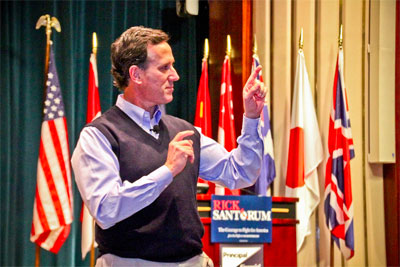
Via RickSantorum.com
I admit at the outset that this is a frivolous, silly topic. But I have to get it off my chest. And you know, it's the weekend, so why not?
In my never-ending fascination with the primaries as entertainment (a possibly-not-admirable trait that I’ve fessed up to elsewhere), I’ve been inexplicably fascinated by Rick Santorum’s sweater vests. Of all the visual/material signifiers of the campaign, this is the one I find most perplexing, even bizarre.
In recent weeks, particularly after Santorum mounted an odds-defying surge in Iowa, the vest has been widely scrutinized, becoming the most buzzed-about candidate-style object since Sarah Palin’s glasses. Time called his vests (jokingly) “the unsung heroes of his campaign,” noting the Fear Rick’s Vest Twitter feed, Tumblr, Facebook page and YouTube video. The candidate began to sell “official” Santorum sweater vests for $100, claimed that he was boosting sweater-vest sales in general, and took to wearing one emblazoned with his campaign logo.
What are the semiotics of this particular garment? Demetri Martin once joked that life vests protect you from drowning, bulletproof vests protect you from gunfire — and sweater vests protect you from pretty girls. The popular reading of Santorum’s vest, however, seems to be that it makes him identifiable: a regular guy, down to earth, approachable, a man of the people. The candidate himself offers a talismanic explanation for the style, noting that it was while wearing a sweater vest at an Iowa campaign event that he felt his electoral fortunes beginning to change.
Possibly all of that can be rolled into a reading of the sweater vest as signalling geeky charm, dulling Santorum’s extremely hard-edged rhetoric. As anyone who’s been watching the debates knows, he deploys sharp elbows to underscore his uncompromising views on a variety of social and political issues. And if he was known for much to the general public prior to this election, it was mostly for inflaming ideological opponents. To be blunt, he largely comes across as angry, and sort of a jerk. Given that his more liberal enemies paint him as narrow-minded hate monger, maybe a sweater vest de-fangs that image a bit, at least visually. How threatening, after all, can a man in a sweater vest really be?

Via GQ.com
But it reads differently to me, particularly in considering the logo-ed version. Writing on GQ’s site, self-professed sweater vest-wearer Mark Byrne judges Santorum’s “baggy ass” logo-stitched version “an ugly good luck charm-cum-promotional devise.” E, my wife, says it reminds her of the uniform of a big-box retailer. I'll go along with that, though I'd say valet at a terrible hotel and multilevel marketer also work as comparison points. Broadly I'd say the thing signals a soul-defining lack of authority, a man sadly resigned to the indignities of the assistant manager passed over for promotion. Nobody cares what a guy in a logo-ed sweater vest thinks about trade deficits or foreign policy; we just want him to check in the back to see if any more air filters in the size we happen to need are in stock. Presidential candidates speak often of “serving” the nation, but this is not what they mean.
The last time a sweater played a semiotic role in political discourse, it was Jimmy Carter’s fireside cardigan, signaling (intentions aside) a compromise before nature, a material admission that a time of sacrifice was at hand in the struggle to balance energy policy and personal comfort; this message was received as weak-kneed cowardice.
The logo-emblazoned sweater vest is similar in that it is difficult to imagine someone genuinely wanting to wear such a thing. The reading that it makes Santorum resemble the common man misses the fact that the common man finds himself encased in such garments only under duress: The job requires it; it's in the employee handbook; corporate said I had to; the boss would frown upon me if I didn’t. It is in fact an object of tragedy. It speaks of acquiescence, capitulation, a bitter surrender to cruel fate.
It speaks, in a word, of losing.

Photo by Lars Tunbjork via Bag News Notes Tumblr
Note: The site Bag News Notes has been offering consistently worthwhile commentary on photojournalism from the campaign, and has gathered a panel (photographers, journalists, academic experts) for an online discussion of electoral imagery tomorrow (January 29); details here. Among the topics the panel will consider: "What makes Santorum’s sweater such a icon?"
